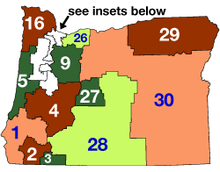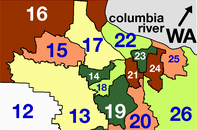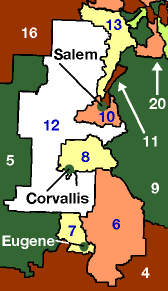75th Oregon Legislative Assembly
The 75th Oregon Legislative Assembly convened beginning on January 12, 2009, for its biennial regular session. All of the 60 seats in the House of Representatives and half of the 30 seats in the State Senate were up for election in 2008; the general election for those seats took place on November 4.
| 75th Oregon Legislative Assembly | |||||
|---|---|---|---|---|---|
| |||||
Opening ceremonies of the session | |||||
| Overview | |||||
| Legislative body | Oregon Legislative Assembly | ||||
| Jurisdiction | Oregon, United States | ||||
| Meeting place | Oregon State Capitol | ||||
| Term | 2009–2010 | ||||
| Oregon State Senate | |||||
| Members | 30 Senators | ||||
| Senate President | Peter Courtney | ||||
| Majority Leader | Richard Devlin | ||||
| Minority Leader | Ted Ferrioli | ||||
| Party control | Democratic Party | ||||
| Oregon House of Representatives | |||||
| Members | 60 Representatives | ||||
| Speaker of the House | Dave Hunt | ||||
| Majority Leader | Mary Nolan | ||||
| Minority Leader | Bruce Hanna | ||||
| Party control | Democratic Party | ||||


The results:
Senate: Democrats 18 seats, Republicans 12 seats
House: Democrats 36 seats, Republicans 24 seats
Democrats took control of the Senate in the 2004 elections, and of the House in the 2006 elections. The Senate had been controlled by Republicans since 1997 and the House since 1990. Many Republican legislators resigned or declined to run for reelection in 2008. Democrats lost one seat in the Senate, and gained five in the House.
The Republican House caucus released an agenda for the 2009 session; priorities included improving economic growth, bringing accountability to state government, improving the state's education system, extending health care and extending in-home care for seniors, enhancing public safety, and managing natural resources.[1] House Majority Leader Dave Hunt (D–Gladstone) responded to the agenda in July 2008, characterizing it as a departure from the failed policies of the George W. Bush administration, and stating that the problems Republicans seek to solve resulted from 14 years of Republican leadership.[2] The House Democrats also released an agenda for 2009.[3]
The legislature, in its 2009 regular session, worked to close a budget shortfall brought on by the economic recession. One critical factor in the legislature's work is the fact that Democrats hold three fifths of the seats in each chamber, theoretically providing the three-fifths supermajority support required by the Oregon Constitution for bills to increase revenue.[4]
In the effort to balance the budget, bills were passed to raise income taxes on corporations and wealthy individuals and households. This is expected to raise US$733 million in revenue over the next two years, which is meant to lessen the need to make spending cuts to state services and programs.[5] Opponents led an effort to force a statewide referendum on these increases,[5] which appeared as Measures 66 and 67 on the January 26, 2010 special election ballot. They were both passed by voters and will take effect February 25, 2010.
The 2009 Legislature passed two major new laws that had been unsuccessfully attempted for several prior years:
The Jobs & Transportation Act (the largest jobs bill in Oregon history) was passed with funding for the Sunrise Highway Corridor in Clackamas County, Newberg-Dundee Bypass, Woodburn/I-5 Interchange, Highway 62 extension in Medford, Beltline/I-5 Interchange in Eugene, and major new permanent annual road funding for all Oregon cities and counties. The Act also allocated $100 to ConnectOregon to improve air, rail, and marine infrastructure.
The Healthy Kids Act was passed to provide health insurance to 90,000 uninsured children and 30,000 low-income adults, which resulted in Oregon reducing the number of uninsured children by more than any other state.
Sessions
The Oregon Constitution requires the Legislative Assembly to hold regular sessions once every two years,[6] but the body can hold special sessions called by either the governor or the body itself. Only four other states' legislatures hold regular sessions every other year: Montana, Nevada, North Dakota, and Texas. Until November 2008, Arkansas was the sixth state.[7] In recent years, the Legislative Assembly has considered switching from biennial to annual regular sessions, as recommended by the Public Commission on the Oregon Legislature. To test the idea, the 74th legislature called itself into a special session in 2008, calling it a "supplemental" session to the regular one in 2007.
Likewise, the current legislative body will hold a supplemental session in 2010, expected to start February 1 and to last four weeks.[7] Among other tasks, the legislature plans to refer a ballot measure to voters to amend the state constitution to permanently change to annual sessions.[7] A ballot measure is required because all constitutional amendments must be approved by voters.[8] The legislature also plans to refer a constitutional amendment to voters to redirect tax rebate funds into a state reserve, or "rainy day," fund.[7]
Notable legislation
2009 regular session
In the effort to balance the budget, House Bills 2639 and 3405 were passed, raising taxes on corporations, and on wealthy individuals and households, respectively. HB 3405 replaced the corporate minimum tax of $10, paid by two thirds of corporations in Oregon, with a sliding scale: At the bottom of the scale, corporations with sales under $500,000 in Oregon will pay $150; at the top, corporations with sales over $100 million will pay $100,000. Corporate income greater than $250,000 will be taxed 7.9 percent for two years, then 7.6 percent afterwards. Corporate income below this threshold will be taxed 6.6 percent. Under HB 2639, taxable income greater than $125,000 for individuals and $250,000 for joint filers will pay a rate of 10.8 percent for the next three years, up from 9 percent; after that, the rate drops to 9.9 percent. Also, income higher than $250,000 for individuals and $500,000 for households will be taxed at 11 percent. These two bills are expected to raise $733 million in revenue over the next two years.[5][9]
The bills cleared the Joint Ways and Means Committee on June 5,[10] and the House passed them June 9.[11] Representative Mike Schaufler (D–Happy Valley) broke with Democrats and voted against both bills, but Rep. Greg Smith (R–Heppner) supported HB 2649, and Rep. Bob Jenson (R–Pendleton) voted for both bills. On June 10, despite expectations that the bills would pass the Senate as easily as they did the House, they "crashed in dramatic fashion"[12] when Senator Mark Hass (D–Beaverton), believing the proposed tax increases should be temporary, joined Republicans and voted against HB 3405. Because no Republicans supported the bill, all 18 Democrats were needed to pass the bill, but Hass's rejection left only 17 votes of approval. The Senate tabled both bills and started negotiations. On June 11, after Hass promised his support of both bills if some revenue from the corporate tax increases were added to the rainy day fund, the Senate voted again and passed both bills.[9] Governor Ted Kulongoski signed them July 20, over a month later.
Opponents of these tax increases said they would worsen Oregon's economy, and they led an effort to force a statewide referendum on these increases.[5] Measures 66 and 67 qualified for the ballot on October 8, and voters passed both measures on January 26, 2010, less than a week before the legislature planned to hold a special session to continue to work on the budget.[7]
Electoral fusion was made possible in Oregon with Senate Bill 326, allowing candidates to list a maximum of three party endorsements on their ballot line.[13] This used to be legal in Oregon until 1958. Some have called this plan "fusion light"[14] to contrast it with electoral fusion as practiced in states like New York, where each candidate gets a ballot line for each party that endorses them. SB 326 also repealed a 2005 law preventing voters who already participated in a party's nominating process from signing an independent candidate's nomination petition for a partisan office.[14] The 2005 law was a response to Ralph Nader's 2004 US presidential candidacy as an independent, raising concerns among Democrats that similar candidates would hurt their chances of being elected.[13] The law drew criticism when Ben Westlund, then an independent member of the state Senate, ran for governor in 2006. He had to wait until after the primary election to start his campaign and verify that the voters who signed his petition hadn't voted in any party's primary.[13]
Other significant new laws passed by the 2009 Legislative Session:
Jobs & Transportation: Passed the Jobs and Transportation Act (the largest jobs bill in Oregon history) with funding for the long-awaited Sunrise Highway Corridor in Clackamas County, Newberg-Dundee Bypass, Woodburn/I-5 Interchange, Highway 62 extension in Medford, Beltline/I-5 Interchange in Eugene, and major new road funding for all Oregon cities and counties. Also allocated $100 to ConnectOregon to improve air, rail, and marine infrastructure.
Health Care: Enacted Healthy Kids Act to provide health insurance to 90,000 uninsured children and 30,000 low-income adults, which resulted in Oregon reducing the number of uninsured children by more than any other state.
Education: Expanded Head Start, Early Head Start, and Relief Nurseries, referred an amendment to the Oregon Constitution to allow state matching funds for K-12 school capital construction (passed by voters as Measure 68 in 2010), and passed record investments in community college facilities on all 17 Oregon campuses.
Business Assistance: Increased loans and created new grant funding for small businesses needing capital, invested in emerging industries, and broadened research and development tax credits.
Public Safety: Restored 24/7 Oregon State Police highway coverage after 15 years of drastic cuts, cracked down on methamphetamine-related metal theft, required DUII offenders to install ignition interlock devices to prevent further drunk driving, protected child abuse funding, and began to shift greater resources to crime prevention.
Environment: Helped businesses and homes become energy efficient, enacted new low carbon fuel standards to improve air quality, and increased protections for Oregon fish and sportfishermen by cracking down on California sea lions.
Veterans: Funded new Veterans Service Officers across Oregon, expanded educational opportunities for veterans, funded an emergency fund for military families, and referred a Constitutional amendment to expand the availability of home loans for veterans (passed by voters as Ballot Measure 70 in 2010).
Human Services: Expanded farmer's market vouchers for low-income families and seniors, provided more school breakfasts and lunches, more summer meals for hungry kids, and Oregon Project Independence for seniors at home.
Civil Rights: Passed the Oregon Workplace Religious Freedom Act to allow greater religious freedom in Oregon workplaces (in 2009) and repealed a 1923 KKK-inspired law that disallowed teachers from wearing religious garb in the classroom (in 2010).
Affordable Housing: The Housing Opportunity Bill created a new trust fund to increase affordable rental housing development, help more Oregonians become home owners, prevent homelessness; and maintain and expand the network of community-based nonprofit housing providers.
Fiscal Responsibility: Required for the first time a pro-active review of Oregon tax breaks each biennium.
Legislative Reform: Reduced the size of the legislative budget and the length of legislative sessions, while increasing public access. Created regular legislative committee days to streamline committee operations during legislative interim periods. Referred to voters a Constitutional amendment to create permanent annual legislative sessions with strict time limits (passed by voters as Ballot Measure 71 in 2010).
2010 supplemental session
On January 27, 2010, the day after Measures 66 and 67 passed, Governor Kulongoski said, "It's time to say 'enough' to budgeting from crisis to crisis,"[15] and directed the legislature to take up an effort in its supplemental session to reform Oregon's kicker law. Instead of sending surplus revenue back to taxpayers as tax rebates, Kulongoski wants surplus revenue to be directed to a state savings account first, commonly described as a "rainy day fund," to help the state balance its budgets during future recessions. House Speaker Hunt said the legislature will focus on jobs, and said kicker reform is "certainly not on the list of definitive things we plan to accomplish."[15]
Senate members
The Oregon State Senate is composed of 18 Democrats and 12 Republicans. In the last elections, the Democratic Party lost one seat: District 27, in the Bend area. Democrat Ben Westlund, a former Republican, left that seat to seek the statewide Oregon State Treasurer office in the same elections. Despite the loss, the Democrats maintained a three-fifths supermajority in the chamber.
Senate President: Peter Courtney (D–11 Salem)
President Pro Tem: Rick Metsger (D–26 Mt. Hood)
Majority Leader: Richard Devlin (D–19 Tualatin)
Minority Leader: Ted Ferrioli (R–30 John Day)



Senate committees
Committee assignments were announced December 9, 2008.[19]
|
Business & Transportation
Commerce & Workforce Development
Consumer Protection & Public Affairs
Education & General Government
|
Environment & Natural Resources
Finance & Revenue
Human Services & Rural Health Policy
|
Health Care & Veterans' Affairs
Judiciary
Rules
|
Joint Ways & Means committee
|
Senators
|
Representatives
|
|
Human Services Subcommittee
Education Subcommittee
General Government Subcommittee
|
Capital Construction & Information
Natural Resources Subcommittee
|
Public Safety Subcommittee
Transportation & Economic
|
House members
The Oregon House of Representatives is composed of 36 Democrats and 24 Republicans. Democrats gained five seats over the previous session, in which they had a slim 31–29 majority; the gain is the greatest accomplished by either party since at least 1985.[21] The 36-seat threshold is a significant one, as it gives Democrats a three-fifths supermajority in the chamber and allows them to pass bills which will raise taxes or fees without Republican support.[21]
Speaker: Dave Hunt (D–40 Gladstone)
Speaker Pro Tem: Arnie Roblan (D–9 Coos Bay)
Majority Leader: Mary Nolan (D–36 Portland)
Co-Chair of Ways and Means: Peter Buckley (D–5 Ashland)
Majority Whip: Tina Kotek (D–44 Portland)
Deputy Majority Whip: Tobias Read (D–27 Washington County)
Assistant Majority Leader (Policy): Sara Gelser (D–16 Corvallis)
Assistant Majority Leader (Political): Phil Barnhart (D–11 Eugene)
Republican Minority Leader: Bruce Hanna (R–7 Roseburg)
Deputy Republican Leader: Kevin Cameron (R–19 Salem)
Republican Whip: Ron Maurer (R–3 Grants Pass)
Deputy Republican Whip: TBD
House committees
|
Agriculture, Natural Resources and Rural Communities
Business and Labor Committee
Business and Labor Subcommittee
Consumer Protection Committee
Education Committee
Environment and Water Committee
|
Health Care Committee
House Administration Committee
Human Services Committee
Judiciary Committee
Land Use Committee
|
Sustainability and Economic
Transportation Committee
Revenue Committee
Rules Committee
Veterans and Emergency
|
See also
- Oregon legislative elections, 2008
References
- Oregon House Republicans: Building a better Oregon Archived March 25, 2009, at the Wayback Machine (2009 agenda)
- "House Majority Leader Dave Hunt Statement on House Republican Agenda for 2009" (PDF) (Press release). July 12, 2008.
- Oregon House Democrats 2009 Roadmap for Oregon's Future
- Measure 25, approved by voters in 1996, added the following language to the Oregon Constitution: "Three-fifths of all members elected to each House shall be necessary to pass bills for raising revenue." (Art. IV §25(2))
- Cain, Brad (July 29, 2009). "Tax foes open petition drive". The Register-Guard. Salem: RG Media Company. Associated Press. Retrieved August 1, 2009.
- Oregon Constitution, Art. IV §10: "The sessions of the Legislative Assembly shall be held biennially at the Capitol of the State commencing on the second Monday of September, in the year eighteen hundred and fifty eight, and on the same day of every second year thereafter, unless a different day shall have been appointed by law."
- Wong, Peter (July 6, 2009). "Budget will haunt 2010 session". Statesman Journal. Salem: Gannet Co. Retrieved August 1, 2009.
- Oregon Constitution, Art. XVII §1: Any amendment or amendments to this Constitution may be proposed in either branch of the legislative assembly, and if the same shall be agreed to by a majority of all the members elected to each of the two houses, such proposed amendment or amendments shall, with the yeas and nays thereon, be entered in their journals and referred by the secretary of state to the people for their approval or rejection, at the next regular general election, except when the legislative assembly shall order a special election for that purpose...
- Esteve, Harry (June 11, 2009). "Oregon bills raising business, personal taxes win final approval". The Oregonian. Portland: Advance Publications. Retrieved August 1, 2009.
- Esteve, Harry (June 5, 2009). "Plan to raise Oregon taxes advances". The Oregonian. Portland: Advance Publications. Retrieved August 1, 2009.
- Esteve, Harry (June 9, 2009). "Tax increases pass Oregon House; Senate OK expected". The Oregonian. Portland: Advance Publications. Retrieved August 1, 2009.
- Esteve, Harry (June 10, 2009). "Oregon Democrat Hass derails tax-increase bill". The Oregonian. Portland: Advance Publications. Retrieved August 1, 2009.
- Mapes, Jeff (July 6, 2009). "Minor party candidates gain clout with new Oregon law". The Oregonian. Portland: Advance Publications. Retrieved August 1, 2009.
- Wong, Peter (July 17, 2009). "Bill eases path for outsider candidates". Statesman Journal. Salem: Gannet Co. Retrieved August 1, 2009.
- Esteve, Harry (January 27, 2010). "Kulongoski wants 'kicker' reform in wake of tax increases". The Oregonian. Portland: Advance Publications. Retrieved January 29, 2010.
- Kurt Schrader resigned prior to the start of the session when elected to the United States House of Representatives in 2008.
- Appointed by county commissioners, January 2009.
- "Martha Schrader will replace husband in State Senate". The Oregonian. January 9, 2009. Retrieved January 10, 2009.
- "State Senate committees announced". The Oregonian. December 9, 2008.
- Once appointed, the incoming senator in District 20 will replace the Senate President on these two committees.
- Cole, Michelle; Janie Har (November 5, 2008). "Oregon Democrats score GOP-proof majority". The Oregonian.
External links
- Chronology of regular legislative sessions from Oregon Blue Book
- Chronology of special legislative sessions from Blue Book
- List of members of 2007 session from Oregon State Archives
- Official overview of bills considered during the 2009 regular session
- Official overview of bills considered during the 2010 special session
| Preceded by 74th legislature |
Seventy-fifth Oregon Legislative Assembly 2009–2010 |
Succeeded by 76th legislature |